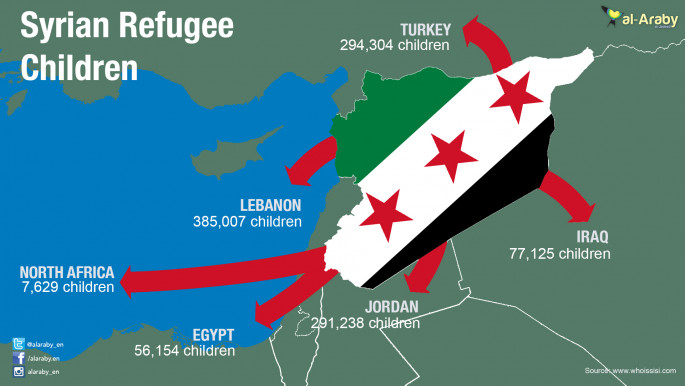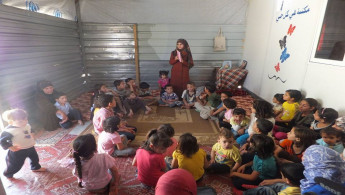Literary hope: young storyteller inspires children at Zaatari camp
Literary hope: young storyteller inspires children at Zaatari camp
A young Syrian woman draws refugee children into unique storytelling sessions inside Zaatari refugee camp in Jordan.
4 min read
Syrian refugee children gather for a storytelling session at Zaatari refugee camp in Jordan.
Hanging eagerly onto every word, some fifty or so children gather in a small corner of the sprawling Zaatari refugee camp, and wait for Asmaa al-Rashid to continue telling her tale.
Whereas once these same children looked at this young storyteller with a wary eye, now they come week after week to hear the latest story she’s chosen to tell.
A young wife and mother-of-two, she has sought to change much in the difficult world she and her small family found themselves in after being forced to flee Syria.
Deciding not to give in to the harsh realities of life in one of Jordan’s largest refugee camps, which is increasingly looking like a permanent settlmenet, Asma chose a unique path which has made her quite an inspiration to those around her at the camp.
First, Asma completed a non-profit training program entitled "We Love Reading", which taught refugees the art of Arabic and English storytelling.
Then, Asma gathered the children of other refugeees living around her at the camp and began to read to them stories.
But the idea was alien to many of those living at Zaatari camp. Yet the ridicule did not dissuade her, and patience she contunued her work.
"People around me did not initially appreciate what I was doing, particularly because it was voluntary and free of charge," Asma told The New Arab.
"I was faced with contempt, even from the small children at first! They used to come only to pass time away from the caravans in which they housed."
"Gradually, they stated to open up to the idea and they started to show genuine interest in the stories I read to them."
The success of the storytelling sessions paved the way for Asmaa to embark on an even greater ambition; writing stories herself.
Soon, Asma began penning children's stories, publishing them in a magazine issued inside the camp.
Thereafter followed more writing, with Asma contributing to a magazine for Syrian children called 'Paper Aeroplane'.
"I started writing illustrated books that told stories of the children around me, and of their lives at the camp," Asma said, "I used their real names and later I would read it to them."
"The reaction I received was very positive, because the stories spoke of their reality of living at the camp. Then, other children would come to me and request that I write their story next."
Asma dreams of printing a collection of stories in a book one day and for Syrian children to be able to read them. But more so, she hopes that the children’s current lives at the camp will one day become a distant memory to them.
Yet Asmaa’s ambitions did not stop in merely realising personal goals.
In time, Asmaa has started training a group of female volunteers at the camp to pass on her experience in storytelling.
Her new project is aimed at broadening the participants literary horizons through reading literature.
"This is the first time we read a book that was not part of our curriculum when we were at school!" Asma says, "With time, we have become eager to read more, especially when we read about characters who are trying to resist their circumstances and bring about change."
"The purpose of the programme is to transform and encourage these young women to bring about change to their surroundings no matter how harsh live at the camp is."
Asma’s two childen are still too young to go to school, but she continues her work and says that her task made easier by the support of her husband Fadi who works at a school inside the camp.
"I use this as an opportunity to make up for the difficult circumstances we have been through" Asma said, "so that we can make a better life for our daughters. His support makes it easy for me to do a lot."
Foreign journalists have taken interest in Asmaa's story.
"They expressed their admiration of this experience and presented their moral support and hopes that I will one day my dreams will be realised."
At least 4.4 million Syrian refugees have been registered with the UN High Commissioner for Refugees since 2011.
The UN children's agency UNICEF estimates that 2.6 million Syrian children are no longer in schools. Recent reports have expressed growing concern over the psychological recovery of Syrian children fleeing the war, but the story of Asma the storyteller maybe but one glimmering page in one of the 21st centuries darkest chapters.
Whereas once these same children looked at this young storyteller with a wary eye, now they come week after week to hear the latest story she’s chosen to tell.
A young wife and mother-of-two, she has sought to change much in the difficult world she and her small family found themselves in after being forced to flee Syria.
Deciding not to give in to the harsh realities of life in one of Jordan’s largest refugee camps, which is increasingly looking like a permanent settlmenet, Asma chose a unique path which has made her quite an inspiration to those around her at the camp.
First, Asma completed a non-profit training program entitled "We Love Reading", which taught refugees the art of Arabic and English storytelling.
Then, Asma gathered the children of other refugeees living around her at the camp and began to read to them stories.
But the idea was alien to many of those living at Zaatari camp. Yet the ridicule did not dissuade her, and patience she contunued her work.
"People around me did not initially appreciate what I was doing, particularly because it was voluntary and free of charge," Asma told The New Arab.
"I was faced with contempt, even from the small children at first! They used to come only to pass time away from the caravans in which they housed."
"Gradually, they stated to open up to the idea and they started to show genuine interest in the stories I read to them."
The success of the storytelling sessions paved the way for Asmaa to embark on an even greater ambition; writing stories herself.
Soon, Asma began penning children's stories, publishing them in a magazine issued inside the camp.
Thereafter followed more writing, with Asma contributing to a magazine for Syrian children called 'Paper Aeroplane'.
"I started writing illustrated books that told stories of the children around me, and of their lives at the camp," Asma said, "I used their real names and later I would read it to them."
"The reaction I received was very positive, because the stories spoke of their reality of living at the camp. Then, other children would come to me and request that I write their story next."
Asma dreams of printing a collection of stories in a book one day and for Syrian children to be able to read them. But more so, she hopes that the children’s current lives at the camp will one day become a distant memory to them.
Yet Asmaa’s ambitions did not stop in merely realising personal goals.
In time, Asmaa has started training a group of female volunteers at the camp to pass on her experience in storytelling.
Her new project is aimed at broadening the participants literary horizons through reading literature.
"This is the first time we read a book that was not part of our curriculum when we were at school!" Asma says, "With time, we have become eager to read more, especially when we read about characters who are trying to resist their circumstances and bring about change."
"The purpose of the programme is to transform and encourage these young women to bring about change to their surroundings no matter how harsh live at the camp is."
Asma’s two childen are still too young to go to school, but she continues her work and says that her task made easier by the support of her husband Fadi who works at a school inside the camp.
"I use this as an opportunity to make up for the difficult circumstances we have been through" Asma said, "so that we can make a better life for our daughters. His support makes it easy for me to do a lot."
Foreign journalists have taken interest in Asmaa's story.
"They expressed their admiration of this experience and presented their moral support and hopes that I will one day my dreams will be realised."
At least 4.4 million Syrian refugees have been registered with the UN High Commissioner for Refugees since 2011.
The UN children's agency UNICEF estimates that 2.6 million Syrian children are no longer in schools. Recent reports have expressed growing concern over the psychological recovery of Syrian children fleeing the war, but the story of Asma the storyteller maybe but one glimmering page in one of the 21st centuries darkest chapters.
 |



